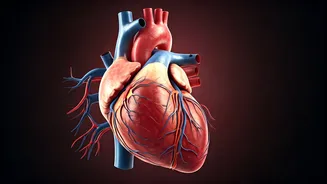Myth Busting Heart Attacks
The conventional understanding of heart attack symptoms often centres around chest discomfort, yet this is not always the case, according to experts in the medical
field. Cardiovascular surgeon Dr. London highlights that this assumption represents a substantial misconception. This article endeavours to shed light on alternative manifestations of a heart attack, underscoring the necessity of acknowledging a diverse range of symptoms. By moving beyond ingrained notions, individuals can more effectively identify potential cardiac emergencies and seek suitable medical intervention. The primary aim is to enhance awareness, urging people to pay attention to subtle cues that could signal underlying heart issues.
Subtle Signs Explained
Often, the symptoms of a heart attack extend beyond immediate chest distress. Dr. London points out several less obvious indicators that people commonly overlook. These can include unexplained fatigue, particularly during routine activities. Shortness of breath, even without physical exertion, is another critical sign. Furthermore, individuals might experience nausea, accompanied by cold sweats or dizziness. Pain radiating to the arm, jaw, or back is another symptom. These subtle signals, often dismissed as minor ailments, can be early warnings of a severe cardiac event. Paying attention to these often-overlooked symptoms could be crucial in securing timely medical assistance, potentially mitigating the adverse effects of a heart attack.
Recognizing Unseen Symptoms
Beyond the more widely recognized indicators, a variety of less evident symptoms may also hint at a heart attack. The feeling of indigestion or heartburn, often written off as dietary issues, might be significant. Unexplained weakness or a general sense of unease can also signal an underlying cardiac issue. The manifestation of these lesser-known signs necessitates vigilance and careful consideration. It is important to emphasize that recognizing such symptoms, even without chest pain, underscores the significance of prompt medical attention. This emphasis is essential because neglecting these signals could lead to delayed diagnosis and treatment, thereby worsening the possible results of a heart attack.
Immediate Actions Crucial
Should someone encounter symptoms suggestive of a heart attack, prompt action is of utmost importance. Immediate medical intervention can substantially impact the outcome, and every second counts. It is crucial to immediately contact emergency medical services when symptoms emerge. One should stay calm while waiting for help. During this period, if the individual is conscious, they should rest comfortably. It is generally advisable to avoid any strenuous activity. The timely response to symptoms and a proactive approach toward seeking medical assistance may reduce the severity of the heart attack. This approach increases the likelihood of a positive health outcome.
Doctor's Advice Matters
In circumstances where an individual experiences possible heart attack indicators, consulting with a healthcare professional is crucial. A medical assessment can confirm a diagnosis, evaluate the severity of the condition, and establish an appropriate treatment plan. The doctor will conduct several tests, including an electrocardiogram (ECG) and potentially a blood test to evaluate cardiac enzymes. Timely and comprehensive healthcare is pivotal to successfully manage a heart attack. This reinforces the significance of regular check-ups, especially for those with an existing health risk.



















